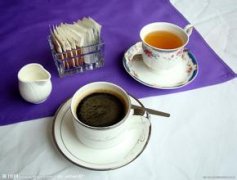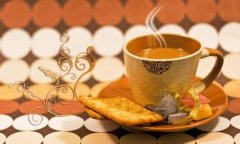A brief introduction to the planting situation, geographical location, climate and altitude of high-quality coffee beans in the blue mountains of Jamaica

"its liquid is golden in the sun and tastes smooth. According to the coffee book, Blue Mountain is the only bitter and sour coffee in the world that people can enjoy. Just drink it.
Blue Mountain Coffee has the characteristics of all good coffee, not only full-bodied and mellow, but also because of the perfect combination of sweet, sour and bitter coffee, it has no bitter taste at all, only a moderate and perfect sour taste. It is generally drunk on a single product, but because the output is very small and the price is extremely expensive, it is generally made with coffee with a similar taste on the market.
The real Blue Mountain Coffee is made from the best local raw coffee beans, which is the fun of tasters. Its flavor is rich, balanced, fruity and sour, and can meet people's various needs. In addition, the high-quality fresh Blue Mountain coffee has a long-lasting flavor, as drinkers say, with a lingering aftertaste.
The best blue mountain coffee beans are NO.1 peaberry, also known as pearl beans, which are carefully selected small round beans and boutique products at an altitude of 2100 meters.
Flavor: very full-bodied, with long-lasting fruit flavors
Particles: fuller
Suggested baking method: medium baking
There are three varieties of Jamaican coffee: Jamaican Blue Mountain Coffee (Jamaica Blue Mountain Coffee), Alpine Coffee (Jamaica High Mountain Supreme Coffee Beans) and Jamaican Coffee (Jamaica Prime Coffee Beans). Among them, Blue Mountain Coffee and Alpine Coffee are each divided into four grades. From top to bottom in terms of quality, NO.1, NO.2, NO.3 and PB,PB are round beans. According to CIB standards, only coffee grown above 666m above sea level is called Jamaican Blue Mountain Coffee, while coffee grown in Jamaica's Blue Mountain area below 666m is called Alpine Coffee, and coffee grown outside the Blue Mountains is called Jamaican Coffee. It turns out that people in the coffee industry in China generally have a wrong understanding that only coffee grown in the Blue Mountains above 1800 meters above sea level can be called Blue Mountain Coffee. In fact, there is only one manor on the top of the Blue Mountains above 1800, that is, Amber, which is of Chinese descent. The owner of the manor is surnamed Lyn (Lin). Originally from Guangdong, China, the manor has a land area of only 30 hectares and its output is very small. Blue Mountain Coffee is mainly distributed in five mountain areas, such as John Crow,St.John's Peak,Mossman's Peak,High Peak,Blue Mountian Peak in the Blue Mountains. The secret of why Blue Mountain coffee tastes pure: their coffee trees are all on rugged hillsides, and the picking process is so difficult that non-local skilled female workers are simply unable to do it. It is very important to choose the right ripe coffee beans when picking. Immaturity or ripeness will affect the quality of the coffee. The picked coffee beans are shelled on the same day, and then let them ferment for 18 hours. After that, the coffee beans were cleaned and screened. The subsequent process is to dry, which must be carried out on the cement floor or on a thick blanket until the humidity of the coffee beans drops to 12% 14%. And then store it in a special warehouse. Take it out and roast when needed, then grind it into powder. These procedures must be strictly mastered, otherwise, the quality of coffee will be affected.
History.
In 1717 King Louis XV of France ordered coffee to be grown in Jamaica, and in the mid-1920 s, the Governor of Jamaica, Nicholas. Nicholas Lawes imported Arabica seeds from Martinique and began to plant them in St. Andrew. To this day, St. Andrews is still one of the three major producers of Jamaican Blue Mountain Coffee, with the other two producing areas: Portland (Portland) and St. Thomas (St.Thomas). In eight years, Jamaica exported more than 375 tons of pure coffee. In 1932, coffee production reached its peak and more than 15000 tons of coffee was harvested.
The caffeine content of Blue Mountain Coffee is very low, which is less than half of that of other coffees, which is in line with the modern concept of health. The same coffee tree species, whether planted in Hawaii, Kenya, Papua New Guinea or anywhere else with a similar climate, cannot produce the flavor of blue mountain coffee beans.
Pure Jamaican Blue Mountain Coffee perfectly combines the unique sour, bitter, sweet, mellow and other flavors of coffee to form a strong and attractive elegant flavor, which is unmatched by other coffee.
People who love Blue Mountain Coffee say: "it is a 'coffee beauty' that combines all the advantages of good coffee."
Jim, general manager of Pitt, which is famous for coffee and tea in the United States, said of Blue Mountain Coffee: "it tastes fragrant, smooth and mellow, and it makes me feel as precious as a gem." It is precisely because the taste of Blue Mountain Coffee is moderate and perfect, so Blue Mountain Coffee is generally drunk in the form of black coffee.
Important Notice :
前街咖啡 FrontStreet Coffee has moved to new addredd:
FrontStreet Coffee Address: 315,Donghua East Road,GuangZhou
Tel:020 38364473
- Prev

A brief introduction to the planting market price of Jamaican Blue Mountain boutique coffee beans with rich fruit flavor
Apart from the above-mentioned enterprises, the coffee beans of other companies, even if they are locally produced in Jamaica, are not authentic Blue Mountain coffee. Second, the packaging of real Jamaican Blue Mountain Coffee is sealed aluminum foil, wrapped in burlap bags, or wooden buckets of logs (only in large quantities). Jamaica is the only country in the world that still retains the wooden barrel packaging of coffee.
- Next

A brief introduction to the treatment method of grinding degree and baking degree of Jamaica Blue Mountain boutique coffee beans with endless aftertaste
But even the largest landowners in the region are small-scale growers by international standards, many of whom are small landowners whose families have been working for two centuries. The coffee industry in Jamaica faces a series of problems, such as the impact of hurricanes, increased labor costs and difficult mechanization of terraces. Many small estates and farms are difficult to be reasonable.
Related
- Detailed explanation of Jadeite planting Land in Panamanian Jadeite Manor introduction to the grading system of Jadeite competitive bidding, Red bid, Green bid and Rose Summer
- Story of Coffee planting in Brenka region of Costa Rica Stonehenge Manor anaerobic heavy honey treatment of flavor mouth
- What's on the barrel of Blue Mountain Coffee beans?
- Can American coffee also pull flowers? How to use hot American style to pull out a good-looking pattern?
- Can you make a cold extract with coffee beans? What is the right proportion for cold-extracted coffee formula?
- Indonesian PWN Gold Mandrine Coffee Origin Features Flavor How to Chong? Mandolin coffee is American.
- A brief introduction to the flavor characteristics of Brazilian yellow bourbon coffee beans
- What is the effect of different water quality on the flavor of cold-extracted coffee? What kind of water is best for brewing coffee?
- Why do you think of Rose Summer whenever you mention Panamanian coffee?
- Introduction to the characteristics of authentic blue mountain coffee bean producing areas? What is the CIB Coffee Authority in Jamaica?

